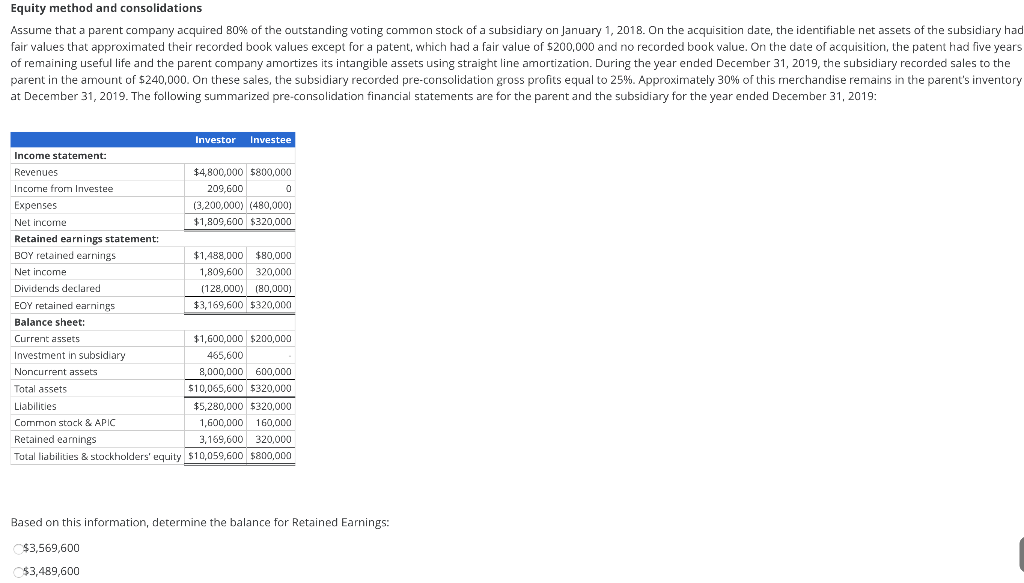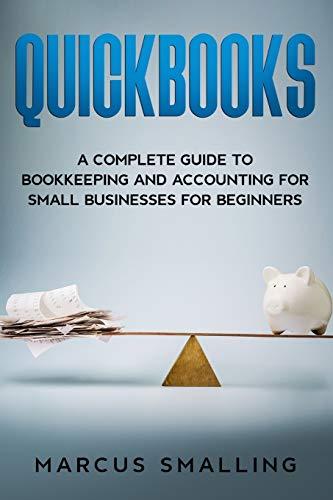Answered step by step
Verified Expert Solution
Question
1 Approved Answer
Please help! Equity method and consolidations Assume that a parent company acquired 80% of the outstanding voting common stock of a subsidiary on January 1,

Please help!
Equity method and consolidations Assume that a parent company acquired 80% of the outstanding voting common stock of a subsidiary on January 1, 2018. On the acquisition date, the identifiable net assets of the subsidiary had fair values that approximated their recorded book values except for a patent, which had a fair value of $200,000 and no recorded book value. On the date of acquisition, the patent had five years of remaining useful life and the parent company amortizes its intangible assets using straight line amortization. During the year ended December 31, 2019, the subsidiary recorded sales to the parent in the amount of $240,000. On these sales, the subsidiary recorded pre-consolidation gross profits equal to 25%. Approximately 30% of this merchandise remains in the parent's inventory at December 31, 2019. The following summarized pre-consolidation financial statements are for the parent and the subsidiary for the year ended December 31, 2019: Investor investee Income statement: Revenues $4,800,000 $800,000 Income from Investee 209,600 Expenses (3,200,000) (480,000) Net income $1,809,600 $320,000 Retained earnings statement: BOY retained earnings $1,488,000 $80,000 Net income 1,809,600 320,000 Dividends declared (128,000) (80,000) EOY retained earnings $3,169,600 $320,000 Balance sheet: Current assets $1,600,000 $200,000 Investment in subsidiary 465,600 Noncurrent assets 8,000,000 600,000 Total assets $10,065,600 $320,000 Liabilities $5,280,000 $320,000 Common stock & APIC 1,600,000 160,000 Retained earnings 3,169,600 320,000 Total liabilities & stockholders' equity $10,059,600 $800,000 Based on this information, determine the balance for Retained Earnings: $3,569,600 $3,489,600 Equity method and consolidations Assume that a parent company acquired 80% of the outstanding voting common stock of a subsidiary on January 1, 2018. On the acquisition date, the identifiable net assets of the subsidiary had fair values that approximated their recorded book values except for a patent, which had a fair value of $200,000 and no recorded book value. On the date of acquisition, the patent had five years of remaining useful life and the parent company amortizes its intangible assets using straight line amortization. During the year ended December 31, 2019, the subsidiary recorded sales to the parent in the amount of $240,000. On these sales, the subsidiary recorded pre-consolidation gross profits equal to 25%. Approximately 30% of this merchandise remains in the parent's inventory at December 31, 2019. The following summarized pre-consolidation financial statements are for the parent and the subsidiary for the year ended December 31, 2019: Investor investee Income statement: Revenues $4,800,000 $800,000 Income from Investee 209,600 Expenses (3,200,000) (480,000) Net income $1,809,600 $320,000 Retained earnings statement: BOY retained earnings $1,488,000 $80,000 Net income 1,809,600 320,000 Dividends declared (128,000) (80,000) EOY retained earnings $3,169,600 $320,000 Balance sheet: Current assets $1,600,000 $200,000 Investment in subsidiary 465,600 Noncurrent assets 8,000,000 600,000 Total assets $10,065,600 $320,000 Liabilities $5,280,000 $320,000 Common stock & APIC 1,600,000 160,000 Retained earnings 3,169,600 320,000 Total liabilities & stockholders' equity $10,059,600 $800,000 Based on this information, determine the balance for Retained Earnings: $3,569,600 $3,489,600Step by Step Solution
There are 3 Steps involved in it
Step: 1

Get Instant Access to Expert-Tailored Solutions
See step-by-step solutions with expert insights and AI powered tools for academic success
Step: 2

Step: 3

Ace Your Homework with AI
Get the answers you need in no time with our AI-driven, step-by-step assistance
Get Started


